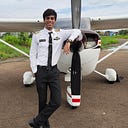What are SPL, PPL, CPL, and ATPL?
The journey to become a Captain is not a cake walk, it not only requires immense training and experience but also requires different levels of licenses as well. And the last thing we want is confusion between the licenses which ends up making us pay extra or diverting us from our track. One tiny confusion and you will end up paying extra money or go on a different track.
The four fundamental licenses of Indian Civil Aviation are Student Pilot License, Private Pilot License, Commercial Pilot License, and Airline Transport Pilot license. In this blog, I have written about these four licenses in detail for a better understanding.
- Student Pilot License (SPL):
The first and the foremost license you require to attain any higher category of license is your Student Pilot License (SPL). The flight to become a Captain take-off from obtaining a SPL. In order to begin your flight training, you need SPL. In layman terms, it is similar to the learner license for a car/scooter.
Flying club issues SPL. To issue this license, in the form of a test, the cadet has to give a small viva conducted by any DGCA certified examiner (They can be from the same flying club or some other flying club, depending upon the availability). There are certain requirements to attain a SPL license.. (To know about the eligibility criteria, click here). Since SPL is just a license for your flight training, you are not allowed to have any passengers on board.
Before this viva, the flying club usually conducts a small SPL preparatory class. Most of the flying clubs make it compulsory so that the student starts to get trained as per the flying club standards.
2. Private Pilot License (PPL):
After getting SPL, you get various options of license to choose from depending upon your interests. Many aviation enthusiasts have endless love for aircraft and wish to pursue flying aircraft just as their hobby and not a career. They can attain a Private Pilot License. (To know the eligibility criteria, click here).
This license gives you the power to fly an aircraft for your personal use, but not for renumeration purposes. The major difference between the SPL and PPL is, with PPL, you are eligible to carry passengers with you but not allowed to earn on it. And keeping in mind, you can only fly smaller aircraft (Cessna 172, Diamond 40/42 etc). In addition, you need 40 hours of flying experience and 3 papers to clear. (Click here to know the flying requirements)
In India, if you wish to become a CPL holder (which I will be talking about in the latter part of the blog), then it is not compulsory to attain PPL. Whereas outside India, if you wish to become a CPL holder, it is necessary to obtain PPL.
3. Commercial Pilot License (CPL):
Commercial Pilot License is the ticket you need to start earning as a pilot. A CPL is a minimum requirement that you need if you wish to pursue flying as a profession. CPL opens up the market for you. Once you become a Commercial Pilot, there is a wide range of posts you can apply for like, an airline, flying clubs as a flying instructor, coast guard, Airforce, chartered companies, or Cargo flights.
The difference between CPL and PPL is, you can fly a plane for remuneration for any purpose. Secondly, now you are eligible to operate in high-risk positions, therefore the required number of flying hours increases 200–250 hours, and the training is relatively stringent. (Click here to know the flying requirements)
For airline personnel, this is the penultimate license. With the help of this license, you will be eligible to be the second pilot. In order to become the Captain for the flight, you need a higher category of license, i.e., Airline Transport Pilot License.
4. Airline Transport Pilot License (ATPL):
During your journey of becoming a pilot, what is the constant thing that keeps running in your mind? “I want to be the captain of the plane!” Captaincy is every cadet’s dream. To be a Pilot in Command or a Captain in a scheduled air carrier, you need an Airline Transport Pilot License. It is the highest level of license a pilot can attain in Civil Aviation.
A captain is someone who is held responsible for every action taken in the flight. It is his responsibility to look after the safety of not only the billion-dollar aircraft but also of every passenger or crew on board. Since being a Captain is a huge responsible position, the training imparted is also never compromised. It takes about 1500 hours of flying experience and clearing of a few papers to be eligible to attain ATPL. (To know the requirements of ATPL, click here).
These were the 4 licenses that you have to attain till you become a Captain. Which one do you wish to obtain?
